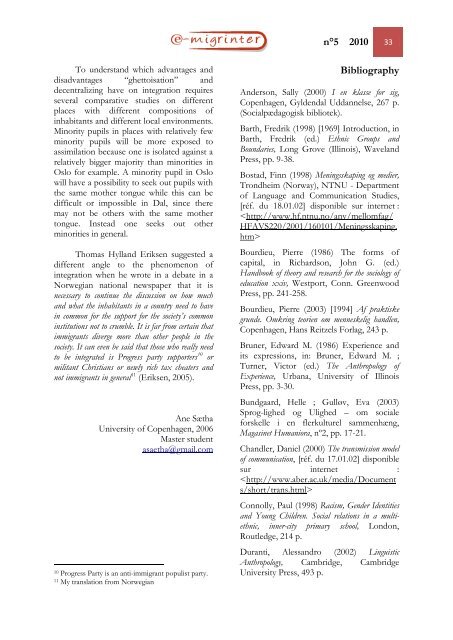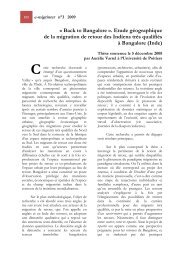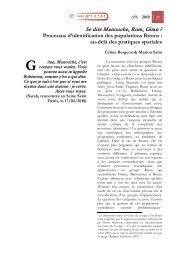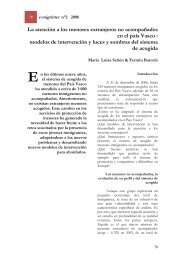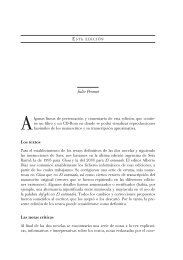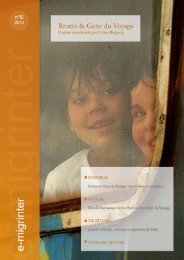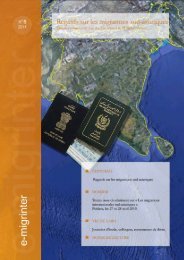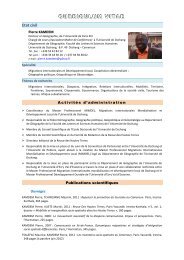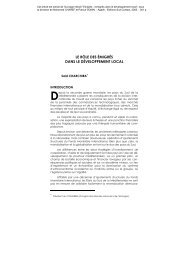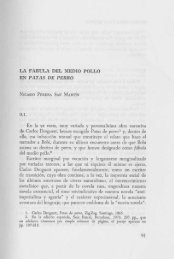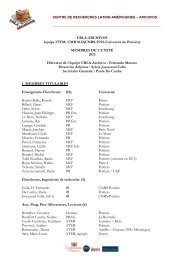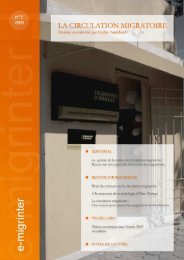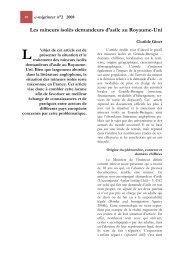e-migrinter 2010 numéro 05 - Maison des Sciences de l'Homme et ...
e-migrinter 2010 numéro 05 - Maison des Sciences de l'Homme et ...
e-migrinter 2010 numéro 05 - Maison des Sciences de l'Homme et ...
Create successful ePaper yourself
Turn your PDF publications into a flip-book with our unique Google optimized e-Paper software.
n°5 <strong>2010</strong> 33<br />
To un<strong>de</strong>rstand which advantages and<br />
disadvantages “gh<strong>et</strong>toisation” and<br />
<strong>de</strong>centralizing have on integration requires<br />
several comparative studies on different<br />
places with different compositions of<br />
inhabitants and different local environments.<br />
Minority pupils in places with relatively few<br />
minority pupils will be more exposed to<br />
assimilation because one is isolated against a<br />
relatively bigger majority than minorities in<br />
Oslo for example. A minority pupil in Oslo<br />
will have a possibility to seek out pupils with<br />
the same mother tongue while this can be<br />
difficult or impossible in Dal, since there<br />
may not be others with the same mother<br />
tongue. Instead one seeks out other<br />
minorities in general.<br />
Thomas Hylland Eriksen suggested a<br />
different angle to the phenomenon of<br />
integration when he wrote in a <strong>de</strong>bate in a<br />
Norwegian national newspaper that it is<br />
necessary to continue the discussion on how much<br />
and what the inhabitants in a country need to have<br />
in common for the support for the soci<strong>et</strong>y’s common<br />
institutions not to crumble. It is far from certain that<br />
immigrants diverge more than other people in the<br />
soci<strong>et</strong>y. It can even be said that those who really need<br />
to be integrated is Progress party supporters 10 or<br />
militant Christians or newly rich tax cheaters and<br />
not immigrants in general 11 (Eriksen, 20<strong>05</strong>).<br />
Ane Sætha<br />
University of Copenhagen, 2006<br />
Master stu<strong>de</strong>nt<br />
asa<strong>et</strong>ha@gmail.com<br />
10 Progress Party is an anti-immigrant populist party.<br />
11 My translation from Norwegian<br />
Bibliography<br />
An<strong>de</strong>rson, Sally (2000) I en klasse for sig,<br />
Copenhagen, Gyl<strong>de</strong>ndal Uddannelse, 267 p.<br />
(Socialpædagogisk bibliotek).<br />
Barth, Fredrik (1998) [1969] Introduction, in<br />
Barth, Fredrik (ed.) Ethnic Groups and<br />
Boundaries, Long Grove (Illinois), Waveland<br />
Press, pp. 9-38.<br />
Bostad, Finn (1998) Meningsskaping og medier,<br />
Trondheim (Norway), NTNU - Department<br />
of Language and Communication Studies,<br />
[réf. du 18.01.02] disponible sur intern<strong>et</strong> :<br />
<br />
Bourdieu, Pierre (1986) The forms of<br />
capital, in Richardson, John G. (ed.)<br />
Handbook of theory and research for the sociology of<br />
education xxiv, Westport, Conn. Greenwood<br />
Press, pp. 241-258.<br />
Bourdieu, Pierre (2003) [1994] Af praktiske<br />
grun<strong>de</strong>. Omkring teorien om menneskelig handlen,<br />
Copenhagen, Hans Reitzels Forlag, 243 p.<br />
Bruner, Edward M. (1986) Experience and<br />
its expressions, in: Bruner, Edward M. ;<br />
Turner, Victor (ed.) The Anthropology of<br />
Experience, Urbana, University of Illinois<br />
Press, pp. 3-30.<br />
Bundgaard, Helle ; Gulløv, Eva (2003)<br />
Sprog-lighed og Ulighed – om sociale<br />
forskelle i en flerkulturel sammenhæng,<br />
Magasin<strong>et</strong> Humaniora, nº2, pp. 17-21.<br />
Chandler, Daniel (2000) The transmission mo<strong>de</strong>l<br />
of communication, [réf. du 17.01.02] disponible<br />
sur intern<strong>et</strong> :<br />
<br />
Connolly, Paul (1998) Racism, Gen<strong>de</strong>r I<strong>de</strong>ntities<br />
and Young Children. Social relations in a multi<strong>et</strong>hnic,<br />
inner-city primary school, London,<br />
Routledge, 214 p.<br />
Duranti, Alessandro (2002) Linguistic<br />
Anthropology, Cambridge, Cambridge<br />
University Press, 493 p.


